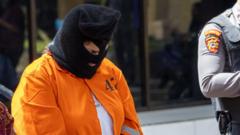British authorities have arrested four individuals associated with the group Palestine Action following a break-in at Brize Norton RAF base, signaling a controversial approach to activism.
Pro-Palestinian Group Faces Terrorism Charges for Air Base Vandalism

Pro-Palestinian Group Faces Terrorism Charges for Air Base Vandalism
Activists of Palestine Action arrested in the U.K. under counterterrorism laws after military base break-in raises debates on misuse of power.
With the recent arrest of four activists associated with Palestine Action under the UK's counterterrorism laws, discussions have ignited surrounding state responses to activist movements. The group's incursion into Brize Norton, the largest Royal Air Force base in the UK, involved acts of vandalism as documented on social media, where activists were seen using red paint on military aircraft. This action has led to the government expressing intentions to ban the radical activist group.
Using a counterterrorism statute from 2000, which is generally reserved for those suspected of planning jihadist or far-right attacks, the police detained two men aged 36 and 24, a 29-year-old woman, and a woman aged 41 suspected of aiding an offender. These unique applications of terrorism legislation prompt concerns about their implications on civil liberties and the definition of terrorism itself.
The police have indicated the investigation pertains to the early morning break-in on June 20, during which activists demonstrated their opposition to military activities linked to Israel. Previously, Palestine Action had targeted sites associated with military companies, including focused actions at Elbit Systems, a weapons maker, and even a high-profile incident at Trump's Turnberry golf resort, where the group infamously defaced property with messages regarding the ongoing conflict in Gaza.
In response to these tactics, some public figures like former President Trump labeled these activists as “terrorists,” advocating for severe punitive measures. This labeling spurs a debate on what constitutes legitimate political protest versus acts of terrorism, particularly regarding the state’s use of legal mechanisms to suppress dissent.
As calls for banning Palestine Action grow louder, the ramifications for individuals engaging in political activism, especially in the context of the Israeli-Palestinian conflict, will be scrutinized further by legal experts and civil rights advocates alike, potentially reshaping the future of activism in the U.K.
Using a counterterrorism statute from 2000, which is generally reserved for those suspected of planning jihadist or far-right attacks, the police detained two men aged 36 and 24, a 29-year-old woman, and a woman aged 41 suspected of aiding an offender. These unique applications of terrorism legislation prompt concerns about their implications on civil liberties and the definition of terrorism itself.
The police have indicated the investigation pertains to the early morning break-in on June 20, during which activists demonstrated their opposition to military activities linked to Israel. Previously, Palestine Action had targeted sites associated with military companies, including focused actions at Elbit Systems, a weapons maker, and even a high-profile incident at Trump's Turnberry golf resort, where the group infamously defaced property with messages regarding the ongoing conflict in Gaza.
In response to these tactics, some public figures like former President Trump labeled these activists as “terrorists,” advocating for severe punitive measures. This labeling spurs a debate on what constitutes legitimate political protest versus acts of terrorism, particularly regarding the state’s use of legal mechanisms to suppress dissent.
As calls for banning Palestine Action grow louder, the ramifications for individuals engaging in political activism, especially in the context of the Israeli-Palestinian conflict, will be scrutinized further by legal experts and civil rights advocates alike, potentially reshaping the future of activism in the U.K.




















